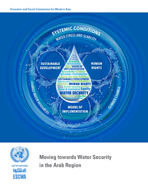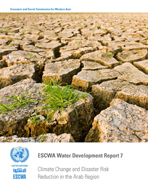Regional Initiative for the Assessment of Climate Change Impacts on Water Resources and Socio-Economic Vulnerability in the Arab Region (RICCAR)
 The Regional Initiative for the Assessment of Climate Change Impacts on Water Resources and Socio-Economic Vulnerability in the Arab Region (RICCAR) is an outcome of a collaborative effort between the United Nations and the league of Arab States (LAS) and respective specialized organizations to respond to the request of the Arab Ministerial Water Council and the Council of Arab Ministers Responsible for the Environment to deepen the understanding of the impact of climate change on water resources and its associated implications for socio-economic vulnerability in the Arab region.
The Regional Initiative for the Assessment of Climate Change Impacts on Water Resources and Socio-Economic Vulnerability in the Arab Region (RICCAR) is an outcome of a collaborative effort between the United Nations and the league of Arab States (LAS) and respective specialized organizations to respond to the request of the Arab Ministerial Water Council and the Council of Arab Ministers Responsible for the Environment to deepen the understanding of the impact of climate change on water resources and its associated implications for socio-economic vulnerability in the Arab region.
The Regional Initiative aims at assessing the impact of climate change on freshwater resources in the Arab Region through a consultative and integrated assessment that seeks to identify the socio-economic and environmental vulnerability caused by climate change impacts on water resources in the Arab region.
More information is available at www.riccar.org
OBJECTIVES
The RICCAR will accomplish the following objectives
The Regional Initiative aims to assess the impact of climate change on freshwater resources in the Arab Region through a consultative and integrated regional initiative that seeks to identify the socio-economic and environmental vulnerability caused by climate change impacts on water resources based on regional specificities.
The outcomes of the assessment aims to provide a common platform for addressing and responding to climate change impacts on freshwater resources in the Arab region by serving as the basis for dialogue, priority setting and policy formulation on climate change adaptation at the regional level.
Mandate
Arab Governments called for the preparation of the assessment through various declarations and resolutions upon which United Nations-League of Arab States (UN-LAS) coordination is based.
Pillars
Pillar 1: Baseline review
To develop a clear picture of the current state of freshwater resources and climate in the Arab Region based on a common set of indicators and methods.
Pillar 2: Impact Analysis and Vulnerability Assessment
To review of existing global circulation models (GCMs) and selection of one to two regional climate models (RCMs) for application at the level of the Arab Region that can be suitably downscaled and incorporate hydrological modeling and scenario development to serve as the analytical basis for conducting the vulnerability assessment.
Pillar 3: Capacity Building & Institutional Strengthening
Institutional strengthening and capacity building in knowledge management, modeling, impact analysis, and vulnerability assessment, with focus given to working through existing networks on climate change to enhance capacity in these areas.
Pillar 4: Awareness Raising & Information Dissemination
Awareness raising activities as well as tools to present simplified key messages to targeted stakeholders on the findings. It will be implemented through: Brochure, Website, Technical Materials, Policy Briefs, Mapping.

METHODOLOGY
The integrated methodology combines climate change impact assessment and vulnerability assessment tools.
The five stages of analysis include:
- Selecting Representative Concentration Pathways (RCPs) and reviewing available Global Climate Models (GCMs).
- Implementing an ensemble of Regional Climate Models (RCMs) over an Arab Domain for downscaling climate projections.
- Interfacing Regional Hydrological Models (RHM) with RCM outputs to analyse climate change impacts on water resources.
- Conducting a socio-economic Vulnerability Assessment (VA) based on impact assessment findings.
- Performing an Integrated Mapping (IM) for facilitating regional policy analysis and dialogue.
OUTPUTS
The Regional Initiative will achieve the following outputs
- Establish an Arab knowledge hub on climate and water.
- Delineate an Arab Domain for regional climate modeling in accordance with CORDEX protocols.
- Complete an ensemble of regional climate projections for the Arab region based on representative concentration pathways.
- Conduct detailed analysis of climate change impacts on water resources based on hydrological modeling tools.
- Incorporate extreme weather events analysis in the climate change impact assessment and vulnerability assessment.
- Identify vulnerability hotspots.
- Increase the capacity of Arab water ministries and meteorological institutions to engage in climate prediction and climate change projection.
- Provide a common and comparable scientific understanding of climate change impacts and associated vulnerabilities across the Arab region.
- Inform policy dialogue, negotiations and exchange among Arab decision-makers.









